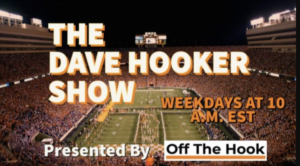Losing a starting quarterback is too often held against a team when it comes to college football preseason predictions. Six of the past 15 Heisman winners were first-year starting quarterbacks at their respective schools, as were two of the past three. Here are the 10 teams who won’t miss their quarterbacks from last year.
10. Vanderbilt
A.J. Swann may have transferred to the LSU Tigers, and Ken Seals to the TCU Horned Frogs, but the Vanderbilt Commodores won’t miss either. They weren’t good. Sure, 23 touchdowns and 11 interceptions combined isn’t bad, especially given their lack of talent, but Vandy needs a dual-threat to overcome those issues and overcome being the laughingstock of the premiere college football league.
Clark Lea has added five newcomers in their place, but the standout will be New Mexico State Aggies transfer Diego Pavia, who comes with that school’s offensive coordinator, Tim Beck. Pavia had nearly 3,000 yards passing and 1,000 rushing last year, and with Beck arriving, he could be a flashy player for Vandy and help them make some noise.
9. Wisconsin
Luke Fickell was stuck with mediocrity at quarterback last year in Tanner Mordecai, who completed 65 percent of his passes but averaged just over six and a half yards an attempt, throwing for 2,066 yards, nine touchdowns and five interceptions. The Wisconsin Badgers need more than that. Mordecai is now with the San Francisco 49ers.
Braedyn Locke is back after starting the final three games of the year, but Wisconsin still fits the bill with Mordecai gone. Neither would start this year anyway. Miami Hurricanes transfer Tyler Van Dyke is a much better fit for this system than he was for Mario Cristobal’s spread, and he has been very efficient through three years. With four years experience, he should be able to carry the Badgers.
8. Wake Forest
Dave Clawson is an underrated offensive genius in college football, something Vol fans have a hard time believing, but he has struggled to find the right quarterback with the Wake Forest Demon Deacons. Mitch Griffs and Michael Kern, last year’s starters, have both transferred out, but they combined for only 13 touchdowns, nine interceptions and under 2,200 yards.
In their place, Clawson added sixth-year senior Hank Bachmeier. After four years with the Boise State Broncos, Bachmeier started last year for the Louisiana Tech Bulldogs. Bachmeier battled injury, which he’s done his whole career, as they went 3-9. However, when fully healthy in 2021, he threw for over 3,000 yards, so in this system, he could be a big upgrade.
7. N.C. State
Dave Doeren lost Brennan Armstrong to graduation and M.J. Morris to the Maryland Terrapins after losing Devin Leary to the Kentucky Wildcats last year. However, he adds one of the best players at the Group of Five level in college football the past few years, Coastal Carolina Chanticleers transfer Grayson McCall.
For his career, McCall has over 10,000 yards passing and 1,100 yards rushing. He has a total of 106 touchdowns, 88 passing, despite missing time due to injury. What’s crazy, though, is he has just 14 interceptions. McCall could be a start for the N.C. State Wolfpack, so the ACC better watch out.
6. Mississippi State
Lots of love was in the air for Mississippi State Bulldogs quarterback Will Rogers, who has since transferred to the Washington Huskies, but without Mike Leach last year, he failed to complete 60 percent of his passes. This isn’t so much about the new quarterback as it is about the new coaching.
Jeff Lebby has worked under Lane Kiffin, Josh Heupel and Kendal Briles and takes over MSU after two years as the Oklahoma Sooners’ offensive coordinator. He’s the next offensive genius in the SEC, and he adds Baylor Bears transfer Blake Shapen. While not fully healthy in three years there, Shapen has over 5,500 yards to go with 36 touchdowns and 13 interceptions, so he’s ready for MSU.
5. Miami
While Wisconsin upgrades by adding Van Dyke, the Hurricanes also upgrade with his replacement. Cameron Ward is headed to South Beach after two months as a Heisman contender for the Washington State Cougars during the 2023 college football season. He is a much better fit for Cristobal’s spread given his speed and could be what makes this program relevant again.
In two years at WSU, Ward completed 65.5 percent of his passes for nearly 7,000 yards, averaging over seven yards an attempt, to go with 48 touchdowns and 16 interceptions. He ran for another 13 touchdowns despite not racking up a lot of yards. A focus on making plays downfield with the ability to run makes him a perfect fit for The U.
4. Michigan State
With Jonathan Smith taking over, the Michigan State Spartans are ready for a new era post Mel Tucker. both of their starting quarterbacks from last year, Katin Houser and Noah Kim, have transferred to lower-level programs, the East Carolina Pirates and Coastal Carolina respectively. They combined for 12 touchdowns and 11 interceptions last year.
Oregon State Beavers transfer Aidan Chiles followed Smith to Michigan State. A dual-threat, Chiles was a backup last year, but he has all the tools to immediately step in and make an impact. In the process, he should be able to make the Spartans an exciting team to watch, and that should help them push the Michigan Wolverines.
3. Kentucky
Leary wasn’t bad last year as Will Levis’ replacement, transferring from N.C. State while Liam Coen returned. However, he wasn’t what Kentucky fans thought they were getting with that combination. With 25 touchdowns and 12 interceptions, his numbers were pedestrian, made worse by him completing just 56 percent of his passes for 2,746 yards and averaging under seven and a half yards an attempt.
This year, Mark Stoops adds a former five-star in Georgia Bulldogs transfer Brock Vandagriff. The only reason Vandagriff couldn’t start at UGA is because the Dawgs have a generational college football talent in Carson Beck. His strengths are his vision and mobility, a perfect combination for the west coast offense new OC Bush Hamden is bringing from Boise State, so this could be a deadly combo.
2. Ohio State
Ryan Day is on the hot seat because the Ohio State Buckeyes didn’t have the right quarterback the year they easily had the most talented team in college football. Kyle McCord was not a fit at all for the system, and he has now transferred to the Syracuse Orange. It’s not that McCord can’t play, but he’s a statue, and that’s not conducive to this spread offense.
Enter Kansas State Jayhawks transfer Will Howard. Although Avery Johnson’s presence is what nudged Howard out, he still landed in the right spot. He’s a dual-threat with over 2,600 yards passing and over 300 rushing last year to go with 33 total touchdowns, and the arrival of Chip Kelly as OC is even better for him. The issue is OSU’s talent has dropped off elsewhere, so they may have missed their window.
1. Tennessee
Joe Milton III was not a fit for Josh Heupel’s offense. It’s mind-boggling that Heupel chose to start him over Hendon Hooker last year, and many feel he should’ve started Nico Iamaleava as a true freshman over Milton. We’re being unfair, though. Milton completed 64.7 percent of his passes for 2,813 yards, averaged eight yards an attempt, and ran for 300 yards. He had 27 total touchdowns and just five picks.
However, in Heupel’s system, those numbers are pedestrian. Iamaleava started the bowl game and was also just efficient rather than putting up numbers, but he was facing the Iowa Hawkeyes. Now, he takes over for the Tennessee Vols, and he is a guy who was created in a lab to run Heupel’s offense. As a result, the numbers should be through the roof this year, so this could be a clear upgrade.








One Response
I’ve been really surprised at how much of the quarterback’s success has to do with the environment they’re placed in.
Three names that come to mind: Joe Burrow (much better at LSU than Ohio State), Kyler Murray (Texas A&M to Oklahoma), and Baker Mayfiled (Texas Tech to Oklahoma). From the limited data there, Oklahoma is good at taking decent quarterbacks and helping them thrive.